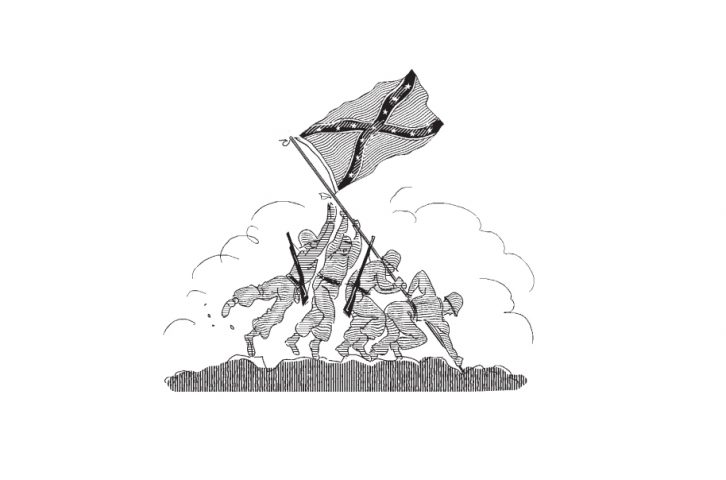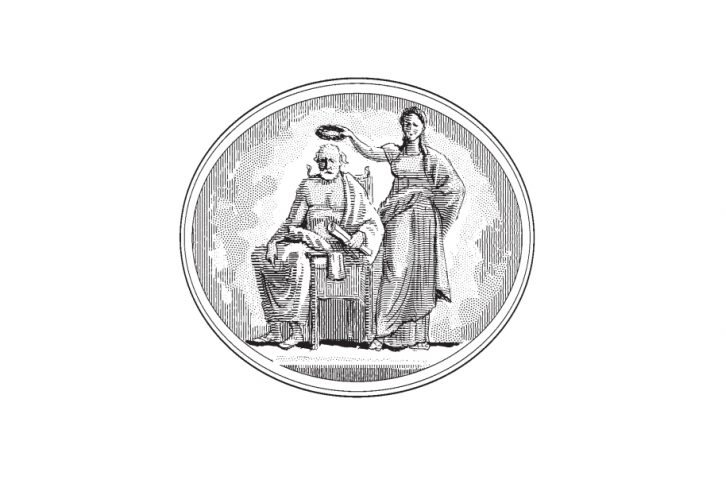Books Reviewed
Since September 11, few historical events have been evoked more frequently than the Christian Crusades to the Holy Land (1095-1291). To Osama bin Laden’s fossilized mind, they happened almost yesterday: modern Israel’s brief existence in Palestine is analogous to the 200-year Frankish occupation of the Levant; Israel’s acquisition of Jerusalem, following the Six-Day War, is every bit as repugnant as the First Crusade that put Westerners in control of the holy city for nearly a century (1099-1187). More important, bin Laden believes that, like the Crusades, the current clash of civilizations will persist for decades until the infidels’ inevitable defeat and withdrawal – in acknowledgment of the greater will of Islam. As this would-be Saladin explained in an October 2001 interview with al-Jazeera:
This is a battle of Muslims against the global crusaders…. God, who provided us with his support and kept us steadfast until the Soviet Union was defeated, is able to provide us once more with his support to defeat America on the same land and with the same people.
In a war of civilizations, our goal is for our nation to unite in the face of the Christian crusade…. This is a recurring war. The original crusade brought Richard [the Lionheart] from Britain, Louis from France, and Barbarossa from Germany. Today the crusading countries rushed as soon as Bush raised the cross. They accepted the rule of the cross.
Although bin Laden and Dr. Zawahiri—al-Qaeda’s Alfred Rosenberg-like theoretician—refer to the hated crusaders often, Western leaders go to great pains to avoid even the memory of those once-upon-a-time religious pests. It’s not merely that President Bush and Tony Blair fear framing the war against terror in terms of an age-old religious clash, or even an embarrassing postcolonial replay. It’s that the Western public as a whole remains deeply ashamed of their crusading ancestors’ zealotry and intolerance. In the words of Christopher Tyerman, a lecturer in medieval history at Hertford College and New College, Oxford, the knights who took the cross have “entered the sphere of public history, where the past is captured in abiding cultural myths of inheritance, self-image and identity. Many groups and nations find their memory awkward, even distressing.”
Just distressing? So toxic has the word “crusade” become in the age of political correctness that we increasingly avoid it altogether; banished are once common expressions like the crusade against drugs or against illiteracy. Western secularism explains much of this hand-wringing, since our elites believe that Christian fundamentalists who advocate things like Bible study in schools are not much different from radical Islamists who blow up heretics and infidels.
What is lost is any recollection that at the time of the Crusades, an ascendant Islam was occupying Spain and Portugal—after failing at Poitiers in the 8th century to take France. Or that Greek-speaking Byzantium was under a constant assault that would culminate in the Muslim occupation of much of the European Balkans, and later still produce Islamic armies at the gates of Vienna. Few remember, either, that the eastern Mediterranean coastal lands originally had been Phoenician and Jewish, then Persian, then Macedonian, then Roman, then Byzantine—and not, until the 7th century, Islamic. Whether intentionally or not, we have accepted bin Laden’s frame of reference: that religiously intolerant Crusaders had gratuitously started a war to take something that was not theirs. That the Ottomans subsequently occupied the Levant for nearly 500 years as unapologetic imperialists seems to matter little to either bin Laden or the West, inasmuch as that brutal subjugation can be understood as an internecine squabble, not a cross-cultural vendetta instigated by Westerners.
* * *
Christopher Tyerman’s thousand-page God’s War is not oblivious to this post-9/11 controversy over the Crusades. Indeed, he candidly informs us that his “perspective is western European. This accords best with my own research experience.” And he further confesses that as a descendent of Crusaders himself, he has plenty of paradoxes to explore, which he insists are best understood through the labyrinth of European church-state politics of the 11th through 13th centuries.
But after that brief throat-clearing, there is almost no reference at all to the relevance of the Crusades to the modern Western struggle against radical Islamists from the Middle East. Instead, he judiciously reminds us, “This study is intended as a history, not a polemic, an account not a judgment…not a confessional apologia or a witness statement in some cosmic lawsuit.” About the closest we get to contemporary allusion is something like the banal, “Thus Islam’s holy war, the lesser jihad, remains a modern phenomenon.”
Well, then, if this erudite, disinterested, and exhaustive study offers almost no enlightenment about the context of our own episode in the long history of Christian-Muslim strife, why such a massive history now? Tyerman, of course, consciously writes in the shadow of Sir Steven Runciman’s three-volume History of the Crusades (1951-4), a magisterial account that is ensured a place alongside Prescott’s History of the Conquest of Mexico and Churchill’s The Second World War as one of the most elegantly written prose narratives in modern English. “It would be folly and hubris,” admits Tyerman, “to pretend to compete, to match, as it were, my clunking computer keyboard with [Runciman’s] pen, at once a rapier and a paintbrush; to pit one volume however substantial, with the breadth, scope and elegance of his three.” Tyerman is right there, for Sir Steven would never have written sentences like this clunker: “The increasing interiorization of faith, shared to some degree by all sides of the major confessional divides, mitigated against certain of the showier forms of medieval devotions that crusading exemplified, the increasingly controversial sale of indulgences merely being the most notorious.” Even when (relatively) succinct, Tyerman often cannot convey a simple thought with clarity: “Both activities are open to reductive interpretations of unavoidable cultural or social compulsion.”
* * *
If Tyerman is, to be frank, a very poor stylist, he nevertheless offers many things new and insightful—besides drawing on a half-century’s worth of archaeological, historical, and epigraphical scholarship since the time of Runciman. Though Tyerman seems oblivious to contemporary comparisons he rightly insists on viewing both the Crusaders and their enemies in the context of their times. Thus he refuses to pass easy moral judgments on people who, in comparison with our own affluence and ease, lived short and miserable lives. It isn’t a question of whether Richard the Lionheart (who in a few hours executed 2,600 Muslim prisoners) or Saladin (who butchered the Templars and Hospitallers after their defeat at Hattin) was cruel, but rather cruel compared to what?
Important here is Tyerman’s stance towards religiosity. He reminds us throughout the narrative that it was not merely glory or money or excitement that drove Westerners of all classes and nationalities to risk their lives in a deadly journey to an inhospitable east, but a real belief in a living God and their own desire to please Him through preserving and honoring the birth and death places of His son. The Crusaders were not merely religious in the modern sense of devout or church-going; akin to present-day Muslims, they cleaved to religion as the ruling element in almost every aspect of their lives. The Crusades arose when the Church, in the absence of strong secular governments, commanded the moral authority to ignite the religious passions of thousands of Europeans—and the Crusades ceased when at last the Church lost such stature.
Tyerman offers some surprising revisionism. One of the great heroes of the Muslim world is the magnetic Kurd, al-Malik al-Nasir Slah al-Dunya wa’l-Din Abu’l Muzaffar Yusuf ibn Ayyub Ibn Shadi al-Kurdi, better known as Salah al-Din or Saladin, sultan of Egypt, who ensured that the Third Crusade would fail and that Richard the Lionheart would return to Europe without recapturing Jerusalem. But as Tyerman notes, most of Saladin’s early efforts were aimed at consolidating power by killing other Muslims. Defeated by Christian armies at Montgisard, Forbelet, Arsuf, and Jaffa, he lost both Tyre and Antioch—despite the numerical and logistical advantages of his home terrain. His chief virtue was his skill as a diplomatic chess-master. He exploited the political differences among the Crusaders, adeptly dividing them against themselves.
For most moderns, the absurdity and hypocrisy of a struggle to restore Christianity in the Holy Land is best exemplified by the so-called Fourth Crusade, in which Western Europeans sacked Constantinople (1204), killing thousands of fellow (Orthodox) Christians and weakening the Eastern church to such a degree that its subsequent defeat by the Ottomans two centuries later was nearly preordained. But Tyerman reminds us that nearly half of the Crusaders had defected and returned home, once the “diversion” to Constantinople was decided upon. The other half, mostly Venetians, were excommunicated in advance of the siege. “Neither some fanciful conspiracy nor a general mindset allegedly susceptible to anti-Greek propaganda adequately explains the course of events,” he writes. “Instead, conflicting ties of solidarity, honor, obligation and advantage exerted the strongest pressures.” He concludes that the motives of the Crusaders were “immediate, contradictory, self-deluding and muddled rather than treacherous or malign.”
Finally, time ran out under the walls of Byzantium; supplies were exhausted and the inept Crusaders were forced to assault the city. The subsequent looting and desecration of icons and art were devastating. The killing was mostly sporadic and limited to the first day of the attack—the infamy magnified, however, by the failure to kill Muslims to the south, and the hatred between Catholicism and Orthodoxy. “If the victors had proceeded to the Holy Land the following spring,” Tyerman writes, “the fall of Constantinople may have never acquired its reputation for unique barbarism.”
* * *
If there are few vivid battle accounts in this dry retelling, he does admirably locate the Crusades in both a larger European and global context. The first Crusade, for example, arose as a complex response both to the Investiture Contest with the German king Henry IV (part of the Church’s effort to purge its corruptions and confirm its authority over European kings), and to the call of the Byzantine Emperor Alexis, who thought Western Christians might save his eroding rule from the Seljuk Turks. A crusade against the Muslims, it was believed, would restore the Church’s prestige by a demonstration of selfless zeal at home and of increased status and power abroad. Once Tyerman guides us through this labyrinth of contemporary agendas and self-interested motives, the decision to send thousands of novice soldiers to the other end of the Mediterranean somehow does not seem so lunatic.
By the same token, he envisions the Crusades in the broadest sense, well beyond the interventions into the Holy Land.God’s War includes chapters on the collective and transnational Christian efforts against unbelievers in the Balkans, Scandinavia, and Russia, as well as against the Ottomans and their clients in the Balkans extending into the 15th century.
In the eleventh hour before the impending Renaissance, Reformation, and Enlightenment, the Church belatedly sought to galvanize the faithful to an almost feverish effort at global crusading, sending its tentacles outward as the nerve center at home enervated. What, then, finally ended the crusading spirit? Not loss of pious devotion or belief in God per se, but rather the rise of the modern, competent, secular state, which won the primary allegiance of millions of devout Europeans, who increasingly rendered unto Caesar what was Caesar’s. Christopher Tyerman’s exhaustive new history is not easy going, but it is often surprising and ironic—reminding us that the crusading spirit is properly seen as tragic rather than melodramatic, and thus “cannot be explained, excused or dismissed either as virtue or sin. Rather, its very contradictions spelt its humanity.”





